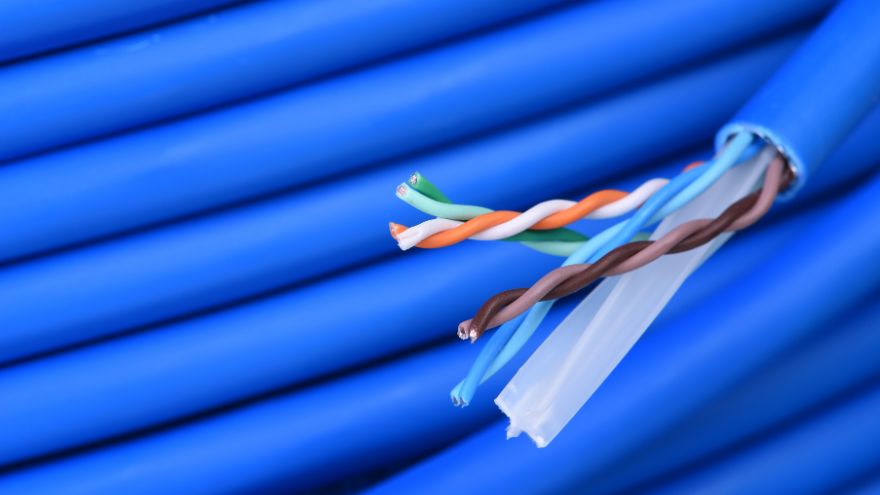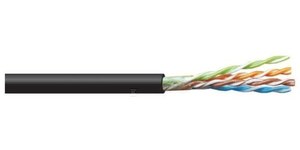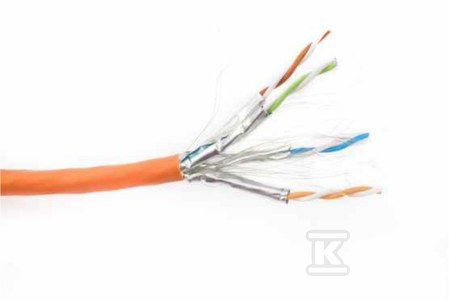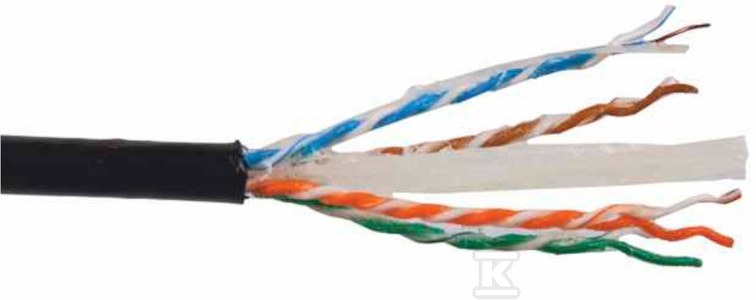The appropriate selection of network cables is crucial, especially in the case of outdoor applications, where they are exposed to unfavorable weather conditions, UV radiation, moisture or even mechanical factors. Undoubtedly, choosing the right cable is of great importance for the quality of the network connection, so it is worth delving deeper into the topic and learning the differences between individual types of UTP and FTP cables intended for outdoor use.

Check UTP/FTP cables at the Onninen wholesaler
What are UTP/FTP cables?
In the field of network technologies, Ethernet cables are an integral element of infrastructure, affecting the efficiency and reliability of data transmission. However, there is one key aspect that deserves special attention: shielding. Ethernet cables, especially those marked UTP (Unshielded Twisted Pair) and FTP (Foiled Twisted Pair), differ in this aspect. Why is shielding so important?
 U/UTP (formerly UTP) – Unshielded Twisted Pair: This is a standard twisted pair Ethernet cable that has no additional shields or covers. It consists of untwisted pairs of wires, which makes it susceptible to electromagnetic interference.
U/UTP (formerly UTP) – Unshielded Twisted Pair: This is a standard twisted pair Ethernet cable that has no additional shields or covers. It consists of untwisted pairs of wires, which makes it susceptible to electromagnetic interference.
- UTPW cable 4x2x0.5 CAT 5E twisted pair to ground DRUM
- SecurityNET U/UTP cat. 6 outdoor cable, gelled PE, 500 m
- ALANTEC UTP computer cable 4PR cat.5e OUTDOOR cable, GEL COATED /305m/
F/UTP (formerly FTP) - Foiled Twisted Pair: This twisted pair has a foil shield around all pairs of wires, which helps protect against electromagnetic interference, but has no additional shielding mesh.
- FTPW cable 4x2x0.5 cat.5E twisted pair to ground DRUM
- SecurityNET F/UTP cable, cat. 6, outdoor, gelled PE, 1000 m
- ALANTEC FTP computer cable 4x2x24AWG OUTDOOR GEL-COATED cat.5e /305m/
U/FTP - Twisted Pair with Individual Foil Shield: In this type of twisted pair, each pair of wires is wrapped in a separate foil shield, which provides some protection against electromagnetic interference.
F/FTP – twisted pair with each pair in a separate foil shield and additional foil shield: This twisted pair has each pair of wires wrapped in a separate foil shield and additionally completely covered with foil, which provides very effective protection against electromagnetic interference.
 SF/UTP (formerly STP) - Foil and Mesh Shielded Twisted Pair: This twisted pair includes a foil shield and mesh shield around all pairs of wires, providing excellent protection against electromagnetic interference.
SF/UTP (formerly STP) - Foil and Mesh Shielded Twisted Pair: This twisted pair includes a foil shield and mesh shield around all pairs of wires, providing excellent protection against electromagnetic interference.
S/FTP (formerly SFTP) – twisted pair with each pair additionally foiled in a mesh shield: In this twisted pair, each pair of wires is wrapped in a foil shield, and the entire twisted pair is covered with a mesh, which provides very effective protection against electromagnetic interference.
- SecurityNET S/FTP cable cat. 7 CU LSZH, 1000m
- ALANTEC Multimedia computer cable S/FTP(SSTP) cat.7 cable 4x2x23AWG 1500 MHz /500m/
- S/FTP cable cat.7A euroclass B2ca LSOH 1500 MHz (10Gb/s) 500m 25 years warranty, quality testing by INTERTEK laboratory (USA)
SF/FTP (formerly S-STP) – twisted pair with each pair wrapped in a foil and mesh shield: This is the most shielded twisted pair, which has each pair of wires wrapped in a foil shield and covered with a mesh, which ensures a very high level of protection against interference electromagnetic.
How to choose the appropriate category of UTP/FTP cables?
Selection of the appropriate category of UTP/FTP cables is crucial when designing telecommunications networks. Copper cables are divided into different categories, each of which has its own specific parameters and applications:
- category 5 – local networks, includes applications using the frequency band up to 100 MHz;
- Category 6 - an extension of ISO/IEC 11801/TlA introduced in 1999, covers cabling whose bandwidth requirements are up to 250 MHz (bandwidth of 200 Mb/s). It provides for the implementation of Gigabit Ethernet (4x 250 MHz = 1 GHz) and ATM 622 Mb/s transmission;
-
 category 6A – introduced with class FA by ISO/IEC 11801 2002:2. Covers the band up to 500 MHz;
category 6A – introduced with class FA by ISO/IEC 11801 2002:2. Covers the band up to 500 MHz; - category 7 – described in ISO/IEC 11801 2002:2. It is possible to implement applications using the band up to 600 MHz. It differs from previous classes by using S/FTP cables (each pair in the shield plus a shield covering four pairs) connected with shielded connectors. For this class of cabling, it is possible to implement data transmission systems with speeds exceeding 1 Gb/s;
- category 7A – introduced by ISO/IEC 11801 2002:2. Covers the band up to 1000 MHz.
Selecting the appropriate UTP/FTP cable category depends on the specific needs of your network. The higher the category, the greater the throughput and better parameters, which is important for efficient data networks. Therefore, it is important to adapt the type of cable to the requirements and expectations regarding the speed and reliability of data transmission.